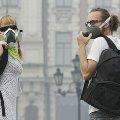Aviation officials say hundreds of thousands of people have left Moscow in the last several days due to the acrid smoke and smog that has enveloped the region.
American Charlotte Turner is one of them. Standing at Domodedova airport, she says she cannot wait to escape.
"It's like walking through a campfire," said Turner. "Everywhere's just smoky. It's been terrible. It's been hard to breathe, really terrible. [You] can't even see one hundred yards. It's like smoking a pack of cigarettes for four hours." The chief of Moscow's health department said earlier this week that around 700 people are dying each day in the city - more than twice the usual number. The high death rate has been attributed to heatstroke and conditions exacerbated by the dangerous chemicals in the air. The authorities have urged people to wear facemasks and advised pregnant women to evacuate the city.
Speaking on Russia's state run English language channel, Dr. Vasily Vlasov, president of the Society for Evidence-Based Medicine, agrees that Muscovites have been in danger. "The smoke which has come to Moscow has increased the carbon monoxide concentration in the air by several times," said Dr. Vlasov. "The smog is surely very toxic and poisonous to breathe. We've registered a death increase in comparison with the usual summertime." That news has Lena Ivanova, who lives in the Moscow region, afraid for her and her family's health. Ivanova says it is dangerous here, like a war. She adds that the fumes are making the animals and everyone sick, and that they are going to leave.
Hundreds of fires are still raging across Russia, affecting nearly all aspects of life and threatening to undercut Russia's economic growth. Some economists believe that the heat wave, fires and drought could cause up to $15 billion in damage.
There has also been mounting anger over the government's response to the disaster. On Tuesday Prime Minister Vladimir Putin took to the air in a water bombing jet to help douse fires in one region. But some analysts say his actions failed to convince many Russians that the authorities have a handle on the situation. Further complicating matters, Emergency Ministry officials say they cannot get many of the blazes under control.
Meanwhile, aid from the United States has arrived in Russia. This morning, U.S. Air Force planes touched down at Vnukovo airport, carrying water tanks, pumps, hand tools and medical kits, among other things.

